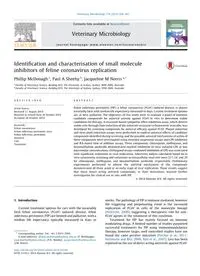
2014 Identification and characterisation of small molecule inhibitors of feline coronavirus replication PDF
Preview 2014 Identification and characterisation of small molecule inhibitors of feline coronavirus replication
Identification and characterisation of small molecule inhibitors of feline coronavirus replication Phillip McDonagh a, Paul A Sheehy b, Jacqueline M Norris a,* a Faculty of Veterinary Science, Building B14, The University of Sydney, Sydney, NSW 2006, Australia b Faculty of Veterinary Science, Building B19, The University of Sydney, Sydney, NSW 2006, Australia 1. Introduction Current treatment options for cats with the invariably fatal feline coronavirus (FCoV) induced disease, feline infectious peritonitis (FIP) are limited and palliative, with a median life expectancy typically measured in days or weeks. The pathology of FIP is immune mediated, however the triggering and perpetuating event is the increased replication of FCoV in cells of the monocyte lineage (Pedersen, 2009), suggesting a therapeutic role for anti- FCoV agents in the treatment of this condition. Treatment for FIP has mainly focused on immune modulating drugs. A limited number of studies purported successful treatments for FIP using immunomodulatory therapy, however larger, well controlled studies have not found the same positive outcomes (Fischer et al., 2011; Hartmann and Ritz, 2008; Ritz et al., 2007). Less has been reported on the use of direct acting antivirals against FCoV. Veterinary Microbiology 174 (2014) 438–447 A R T I C L E I N F O Article history: Received 11 August 2014 Received in revised form 26 October 2014 Accepted 28 October 2014 Keywords: Feline coronavirus Feline infectious peritonitis virus Feline infectious peritonitis Antiviral Cats Treatment A B S T R A C T Feline infectious peritonitis (FIP), a feline coronavirus (FCoV) induced disease, is almost invariably fatal with median life expectancy measured in days. Current treatment options are, at best, palliative. The objectives of this study were to evaluate a panel of nineteen candidate compounds for antiviral activity against FCoV in vitro to determine viable candidates for therapy. A resazurin-based cytopathic effect inhibition assay, which detects viable cells through their reduction of the substrate resazurin to fluorescent resorufin, was developed for screening compounds for antiviral efficacy against FCoV. Plaque reduction and virus yield reduction assays were performed to confirm antiviral effects of candidate compounds identified during screening, and the possible antiviral mechanisms of action of these compounds were investigated using virucidal suspension assays and CPE inhibition and IFA-based time of addition assays. Three compounds, chloroquine, mefloquine, and hexamethylene amiloride demonstrated marked inhibition of virus induced CPE at low micromolar concentrations. Orthogonal assays confirmed inhibition of CPE was associated with significant reductions in viral replication. Selectivity indices calculated based on in vitro cytotoxicity screening and reductions in extracellular viral titre were 217, 24, and 20 for chloroquine, mefloquine, and hexamethylene amiloride respectively. Preliminary experiments performed to inform the antiviral mechanism of the compounds demonstrated all three acted at an early stage of viral replication. These results suggest that these direct acting antiviral compounds, or their derivatives, warrant further investigation for clinical use in cats with FIP. � 2014 Elsevier B.V. All rights reserved. * Corresponding author. Tel.: +61 2 9351 7095. E-mail addresses:
